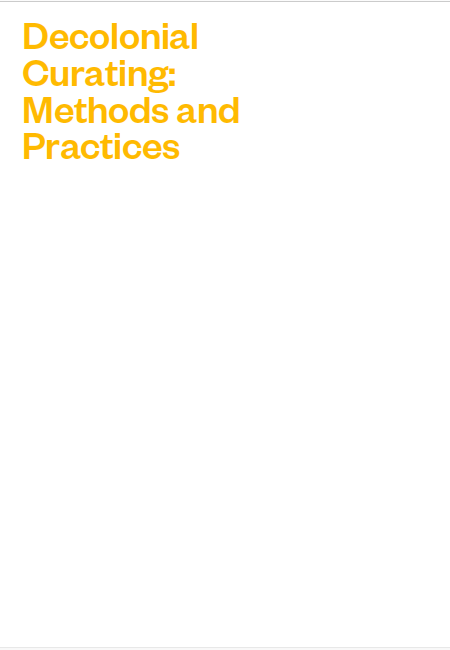About this publication
The annotated bibliographies in this booklet were completed this year and are the outcome of the Decolonizing Curatorial Practice Mellon Seminar in Art History co-taught in Spring 2020 by Professor of Art History Claire Bishop and James Gallery Curator Katherine Carl, Ph.D., at the Graduate Center in spring 2020. The group examined the growth of decolonization movements in art and activism that began in earnest in the 2000s with the Maison des Civilisations et de l’Unité Réunionnaise MCUR) in La Réunion, and the Decolonizing Architecture Art Residency (DAAR) in Beit Sahour, Palestine. In New York, such efforts have taken the form of calls to decolonize the museum both in terms of its exhibitions and organizational structure—from the exhibition “This Place” (Brooklyn Museum, 2016) to the campaign to remove Warren Kanders from the board of the Whitney Museum of American Art (2019). The seminar set out to trace the various historical and theoretical inflections of the term “decolonization” in North and South America, Europe, Africa, Australia, and South Asia, and their impact upon exhibition practice. Due to generous funding from the Andrew W. Mellon Foundation, and with the support of the Ph.D. Program in Art History, the seminar was largely based around visiting speakers with expertise in these regions.
The seminar began with the activist movement Decolonize This Place, whose understanding of decolonization is a confluence of Indigenous rights activism, Black liberation, Palestinian nationalism, and antigentrification. Since the Whitney protests, they gravitated beyond the art world and towards the radical formation FTP (“Fuck the Police,” “Free the People,” or “Feed the People”), and have now launched StrikeMoMA. Françoise Vergès, a feminist activist and intellectual based in Paris, told us about her decolonial tours of the Louvre, her attempts to establish a “museum without objects” in La Réunion, and her innovative pedagogic methods for people of color. Nigerian art historian Chika Okeke-Agulu (Princeton University) presented his co-curated exhibition “Who Knows Tomorrow” (Nationalgalerie, Berlin, 2010) and spoke powerfully against the “decolonial,” arguing that West Africa is still in a postcolonial moment. Paul Chaat Smith, curator at the National Museum of the American Indian in Washington, DC, expressed skepticism about the accessibility of the term “decolonization,” and presented his co-curated exhibition “Americans” (2018–ongoing) as an attempt to appeal to a broad public without condescension or moralization. Julieta González’s exhibition “Memories of Underdevelopment: Art and the Decolonial Turn in Latin America, 1960–1985” (Museo Jumex, Mexico City, 2018), by contrast, understood Latin American decolonization through the lens of 1960s anti-imperialism and dependency theory.
Amongst the most important shows curated by the late Nigerian-born Okwui Enwezor are the 56th Venice Biennale (“All the World’s Futures,” 2015), Documenta 11 (2002) and “The Short Century: Independence and Liberation Movements in Africa, 1945–1994” (rather than more recent writings on Indig - enous epistemology). Berlin-based independent curator Claire Tancons energized the class with her research into Caribbean carnival practices and candid approach to the difficulty of translating these into exhibition formats. Wanda Nanibush, curator of Indigenous art at the Art Gallery of Ontario, discussed the notion of “performing sovereignty” through her rehang of the J.S. McLean Centre for Indigenous & Canadian Art, which included a rejection of chronology and informational labelling.
Our last speakers were Monica Narula and Jeebesh Bagchi of Raqs Media Collective (New Delhi), who confirmed that in South Asia, decolonization still tends to refer to the Partition of India in 1947; the term “decolonial” is emerging as a paradigm to replace the postcolonial/global, but its temporal and geographic reach are still waiting to be more closely defined. In preparing the class, we were struck by the dearth of material that linked decolo-nization to art history and museums. As part of their final assignment, students contributed five entries for an annotated bibliography, each student focusing on a particular continent or region. The following booklet presents the outcome of this literature review, with groupings of texts on decolonial artistic and curatorial strategies in Africa, Australia, Canada, Europe, Latin America, South Asia, and the United States.
Contributors:
Anna Orton-Hatzis
Caroline House
Flora Brandl
Hadley Newton
Isabel Elson
Khushmi Mehta
Mária Beatriz H. Carrión
Monica Espinel
Editor:
Flora Brandl
Seminar co-taught by:
Claire Bishop and Katherine Carl
Click here to open the pdf or below to read or download the accompanying booklet.

